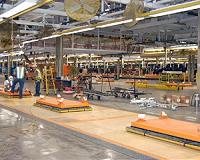 |
Tokyo (AFP) April 15, 2011 A component supply crisis that has strangled auto production in Japan and enforced a slowdown overseas in the wake of the March 11 disasters will last several months, analysts say. Japan's biggest ever quake and the tsunami it unleashed shattered supply chains and crippled electricity-generating facilities, including a nuclear power plant at the centre of an ongoing atomic emergency. Power shortages have hit production across all industries and threaten to throw an export-driven economy into a tailspin, analysts say, amid fears the crisis could speed up a shift of production out of Japan already encouraged by the strong yen. For automakers the world over, the impact has been acute with companies from Toyota to Ford shuttering plants as far afield as Britain, the United States, Turkey, France, Australia, Poland and the Philippines amid a supply shock. "The problem will last for several months and could even last for a year," said Tatsuya Mizuno, an auto industry analyst with Mizuno Credit Advisory in Tokyo. "The supply chain for automakers was seriously damaged. (Japanese firms) have around one month of inventories, but some suppliers have suffered so much it is very unlikely that they will be able to restart full production soon." Many key component manufacturers are based in the worst-hit regions of Japan, their facilities damaged by the 9.0 magnitude earthquake or inundated by the giant wave that followed. The likes of Toyota and Nissan have had to halt assembly lines. Along with Honda, they have announced the restart of their Japanese production but only at half-capacity in a bid to avoid running out of crucial parts. An average car contains 20,000 different components, and only one needs to be missing to stop production. "We are having trouble sourcing electronic, rubber and plastic parts," said Toyota Motor spokesman Paul Nolasco, adding that production shutdowns since March 11 have cost it at least 260,000 vehicles. The world's biggest automaker is struggling to source 150 separate components, he added. One such example is a microcontroller for engine and brake systems made by Japanese electronics firm Renesas, which has a global market share of around 50 percent. Its Ibaraki plant was crippled in the tsunami and will not restart production until June. "It's not possible to substitute this product since (Renesas) has a more than half share of the market," said Mizuno, adding precision products depend on stable electricity for production and a lengthy testing process. A shortage of a type of shiny pigment used in automobile paints that is only made in a single plant in Japan has also hamstrung automakers. The pigment, called Xirallic, is made at a plant owned by German chemical company Merck KGaA and is located in Onahama, a coastal town damaged by the tsunami. Production at the plant is due to restart in June, but Ford has had to limit the production of models painted in colours such as "Tuxedo Black". UBS Securities Japan and JPMorgan Securities Japan forecast that a full recovery in production will come in October or later, due to difficulties that Renesas and other makers face in restoring their plants in disaster-hit areas. "Many component manufacturers' plants were... in Miyagi, Iwate and Fukushima. There are important semiconductor factories in that area," said Mizuno. Honda spokesman Tomohiro Okada said the auto giant had 110 suppliers in areas affected by the earthquake. It has been forced to reduce production in Asia, Europe and the United States. For rival Nissan, the picture is similarly grim. "We have no idea of when full-scale production will be able to start again," said spokesman Mitsuru Yonekawa. According to US bank JP Morgan, Japanese auto production in the archipelago is expected to fall at least 14 percent this year to 7.75 million vehicles. Questions have been raised as to how well automakers understood supply networks feeding the firms they rely on to produce essential parts, and whether better risk management would have left them less exposed, analysts say. In particular, the "just-in-time" delivery system pioneered in Japan and often used in the technology and car sectors to deliver components and raw materials only when they are needed is vulnerable to such supply shocks. "It's difficult for any company to put emphasis on any potential crisis and sacrifice profitability," said Shigeru Matsumura, an auto analyst at SMBC Friend Securities. "But since this disaster happened, all carmakers have to consider the balance between efficient operations and crisis management." There are also concerns that firms may decide to leave Japan, an idea that has gained traction recently as the yen has surged to record levels against the dollar, making exporters' products less competitive. "This will have a great impact on the Japanese economy," said Matsumura.
Share This Article With Planet Earth
Related Links Car Technology at SpaceMart.com
 Ford slashes jobs in Australia, Toyota scales back
Ford slashes jobs in Australia, Toyota scales backSydney (AFP) April 14, 2011 Car giant Ford said Thursday it will shed 240 jobs in Australia and cut daily production by 20 percent, while Toyota scaled back work hours due to supply problems after Japan's quake-tsunami. Ford said the decision was made after a slump in demand for large cars, such as the Falcon and Territory, with plans to redeploy workers at its Geelong and Broadmeadows plants in Victoria state "whereve ... read more |
|
| The content herein, unless otherwise known to be public domain, are Copyright 1995-2010 - SpaceDaily. AFP and UPI Wire Stories are copyright Agence France-Presse and United Press International. ESA Portal Reports are copyright European Space Agency. All NASA sourced material is public domain. Additional copyrights may apply in whole or part to other bona fide parties. Advertising does not imply endorsement,agreement or approval of any opinions, statements or information provided by SpaceDaily on any Web page published or hosted by SpaceDaily. Privacy Statement |